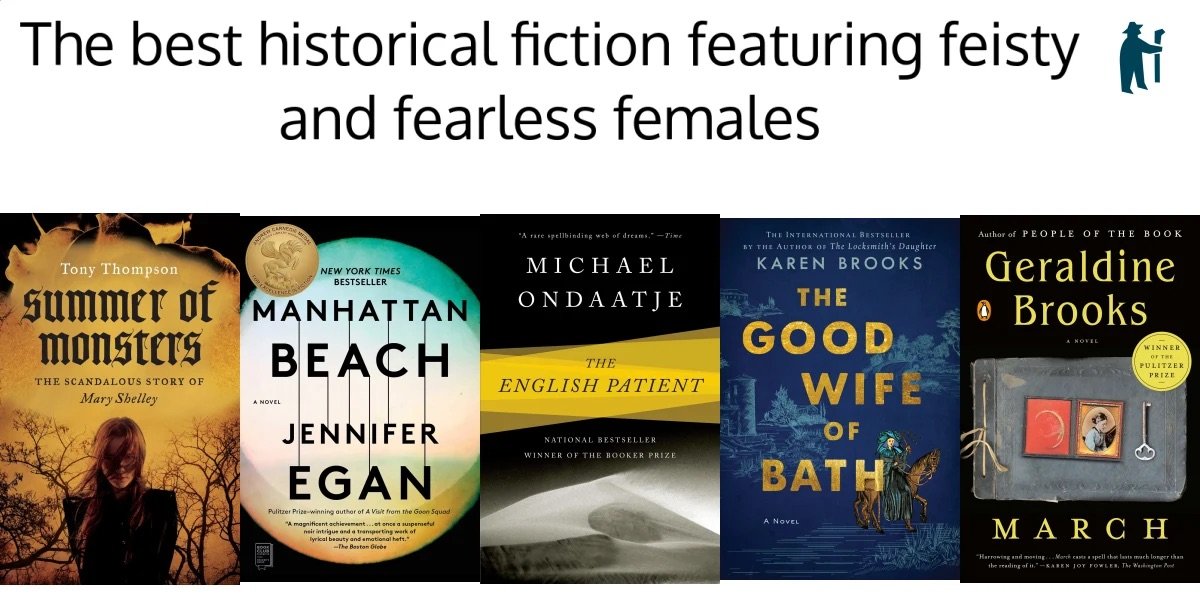Book list: The best historical fiction featuring feisty and fearless females
When Shepherd.com reached out and asked me to compile a book list - on any theme - my thoughts went straight to strong female characters. Most of my favourite characters in literature are strong women - Jo March, Elizabeth Bennet, Jane Eyre. It is their intelligence, and spirit that hooks me. Even when they are misguided or confronting overwhelming odds, they pull themselves back from the brink to begin on a slightly altered path to achieve their purpose. It is the heroine’s journey that draws me into a novel, and it is her journey I wish to describe in my own books.
Here’s the list. Check it out on Shepherd.com, too. The page is beautifully designed.
The Good Wife of Bath by Karen Brooks (2021)
This is quite possibly the funniest book I have ever read and I recommend it for that reason. It will have you laughing out loud. Brooks gives Chaucer’s larger than life, serial monogamist an opportunity to tell her side of the story. And fair enough. Created by Geoffrey Chaucer for The Canterbury Tales in 1392, the Wife of Bath is literature’s first feminist hero. The outspoken and exuberant Alyson (the wife’s real name) suffers immeasurably – physically, emotionally and financially - at the hands of the men she chooses to marry yet she never loses her self-respect and humour. Likewise, she is never broken despite her husbands’ best efforts to tame her.
Summer of Monsters by Tony Thompson (2014)
Thompson’s novel is another story about strong, intelligent and powerful women who are manipulated and used by men. There have been numerous retellings of the birth of Mary Shelley’s novel, Frankenstein. The fact that it occurred on a dark and stormy night is literary folklore. However, Thompson’s tale is the first time it has been told for a YA audience and he puts a wicked spin in the well-known origin story. This appealed to me as an English teacher. The characters - Mary, the poet Shelley, Claire Clairmont and Lord Byron – are given a contemporary vibe. Mary is a lonely and moody teenager, swept off her feet by Shelley who is characterised as the 19th century’s version of a brooding and insatiable rock star, part Mick Jagger, part Nick Cave.
March by Geraldine Brooks (2005)
Brooks’ novel won the Pulitzer Prize for literature in 2006. But it’s not the award that first attracted my attention to this Civil War novel and why I am recommending it now. It was the strong connection to Louisa May Alcott’s Little Women. March tells the story of the March sisters absent father who the reader meets only briefly in Alcott’s novel. However, what drew me into the book was the character of Marmee, the beloved wife and mother in Alcott’s tale but Brooks’ backstory presents her as a passionate and sensual woman with a fiery temper. At times she must be restrained physically when her ire is raised! She is strong and forthright with progressive views, and it is she that holds the March family together while Mr March is away.
The English Patient by Michael Ondaatje (1992)
I first read Ondaatje’s WW2 novel when it won the Booker Prize in 1992. I hated it. ‘Booker Prize, Schmooker Prize,’ I cried. I was at university studying English literature and I believed I knew more than the Booker judges. I didn’t connect with any of the characters, especially the title character. He was too enigmatic to be sympathetic. Having recently reread it (the same copy actually) the story has taken on new life. It's interesting how one's perception can evolve and change with age and experience. It is Hana who resonates with me, and I now view the novel as her story, a coming-of-age story, despite the title. Ondaatje tells her story subtly and beautifully, perhaps in a way that is only possible from a male author.
Manhattan Beach by Jennifer Egan (2017)
Another WW 2 story. This is the first Jennifer Egan novel I read, and I can’t remember why I pulled it from the shelf in the bookstore. Nevertheless, the noir tale of a young woman, Anna Kerrigan, working at a Brooklyn Navy Yard who ‘longs to walk along the bottom of the sea’ had me hooked from that line. It is, in fact, something I once attempted as a child, weighting myself down with my father’s diving weights. I wasn’t successful, but I understand the longing to be underwater rather than above. I never achieved my dream, but Anna does. She becomes the only female navy diver, taking on the dangerous wartime role of repairing ships below the water line. It’s her guts and determination that drive the novel forward and she has so much to teach young, contemporary women.
If my list isn’t enough, here’s some more great books about women.

